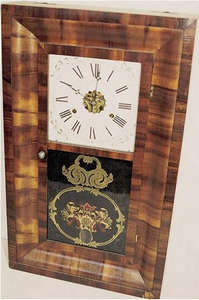George Marsh and William Lewis Gilbert purchased a clock shop in 1828, which they named Marsh, Gilbert & Company. They were soon at work in two Connecticut cities, Bristol and Farmington.
In 1837, when John Birge joined Gilbert, the company name became Birge, Gilbert & Company. They made Empire-style shelf clocks.
The company name continued to change. From 1839 to 1840, the company was known as Jerome, Grant, Gilbert & Company. Clockmakers Zelotas Grant, and Chauncey and Noble Jerome became partners with Gilbert to create Jerome’s inexpensive brass movement clocks.
W. L. Gilbert mahogany OG, eight-daytime & strike, weight driven, 15 1/2 x 26″ h. $250.
In 1841, Gilbert and Lucius Clarke acquired a clock factor}’ in Winsted, Connecticut. Later the town name was changed to Winchester. Ezra Baldwin was a member of this company for a time. From 1841 to 1845 Clarke, Gilbert & Company produced inexpensive brass clocks. In 1845 William Lewis Gilbert purchased Clarke’s share in the company, but three years later, Clarke bought his shares back. The partnership lasted until 1851. The company name became W. L. Gilbert & Company until 1866, when the Gilbert Manufacturing Company was established. In 1871, the Winsted (or Winchester) factor}’ burned down. Gilbert was not a quitter; he formed the William L. Gilbert Clock Company that very same year. Gilbert died in 1890, but the company name was retained for sixty-three years.
George B. Owen managed the company from 1880 to about 1900. Despite financial problems from 1934 to 1957, the company remained active as the William L. Gilbert Clock Corporation.
During World War II, clock production was limited because the war effort required metal. The clock company was allowed to manufacture papiermache case alarm clocks rather than metal ones. The clocks enabled workers to get to their war-related jobs on time.
After the General Computing Company took over the Gilbert Company, the new owners used the name General-Gilbert Corporation.
By 1964, the company clock division was no longer profitable. Spartus Corporation of Chicago and Louisville, Mississippi, purchased the company.

